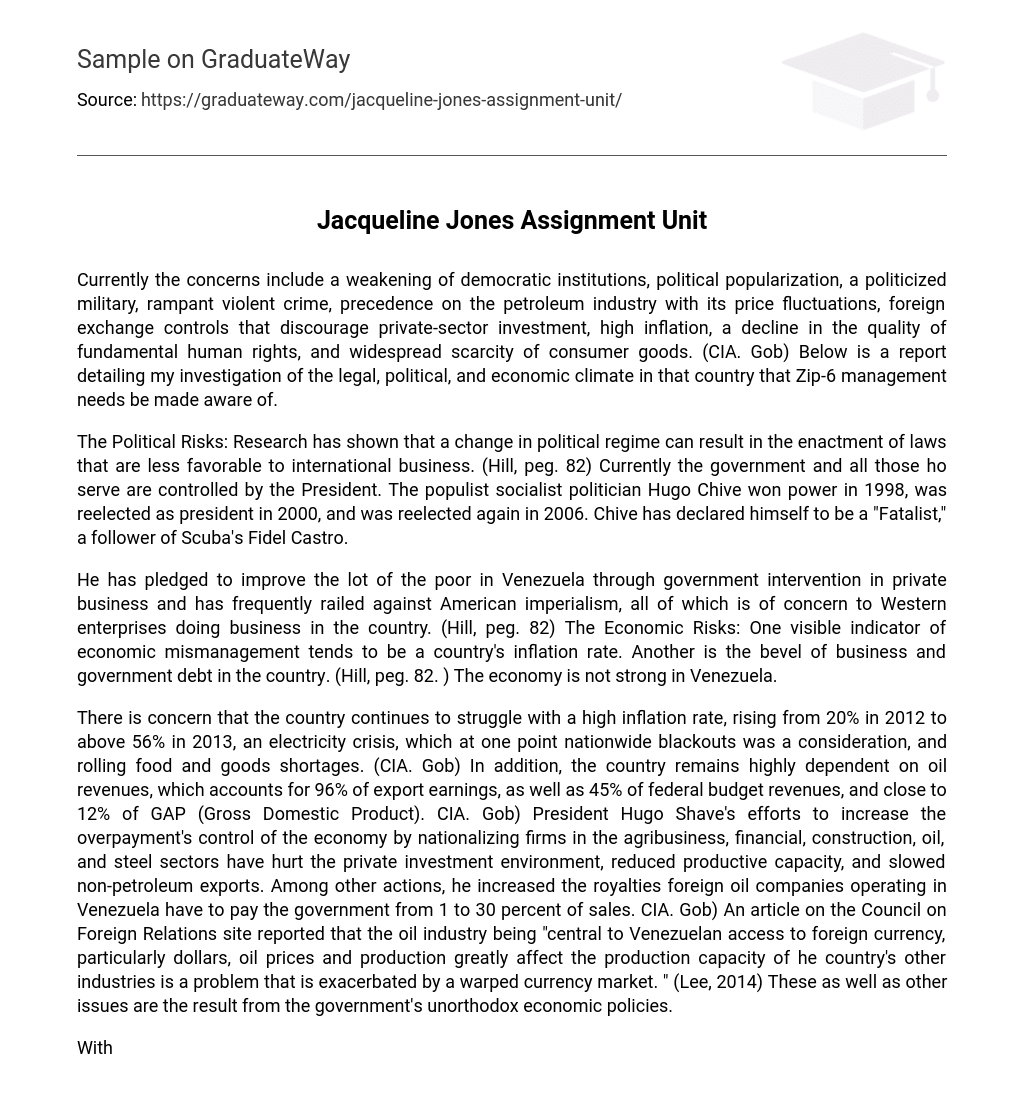Currently the concerns include a weakening of democratic institutions, political popularization, a politicized military, rampant violent crime, precedence on the petroleum industry with its price fluctuations, foreign exchange controls that discourage private-sector investment, high inflation, a decline in the quality of fundamental human rights, and widespread scarcity of consumer goods. (CIA. Gob) Below is a report detailing my investigation of the legal, political, and economic climate in that country that Zip-6 management needs be made aware of.
The Political Risks: Research has shown that a change in political regime can result in the enactment of laws that are less favorable to international business. (Hill, peg. 82) Currently the government and all those ho serve are controlled by the President. The populist socialist politician Hugo Chive won power in 1998, was reelected as president in 2000, and was reelected again in 2006. Chive has declared himself to be a “Fatalist,” a follower of Scuba’s Fidel Castro.
He has pledged to improve the lot of the poor in Venezuela through government intervention in private business and has frequently railed against American imperialism, all of which is of concern to Western enterprises doing business in the country. (Hill, peg. 82) The Economic Risks: One visible indicator of economic mismanagement tends to be a country’s inflation rate. Another is the bevel of business and government debt in the country. (Hill, peg. 82. ) The economy is not strong in Venezuela.
There is concern that the country continues to struggle with a high inflation rate, rising from 20% in 2012 to above 56% in 2013, an electricity crisis, which at one point nationwide blackouts was a consideration, and rolling food and goods shortages. (CIA. Gob) In addition, the country remains highly dependent on oil revenues, which accounts for 96% of export earnings, as well as 45% of federal budget revenues, and close to 12% of GAP (Gross Domestic Product). CIA. Gob) President Hugo Shave’s efforts to increase the overpayment’s control of the economy by nationalizing firms in the agribusiness, financial, construction, oil, and steel sectors have hurt the private investment environment, reduced productive capacity, and slowed non-petroleum exports. Among other actions, he increased the royalties foreign oil companies operating in Venezuela have to pay the government from 1 to 30 percent of sales. CIA. Gob) An article on the Council on Foreign Relations site reported that the oil industry being “central to Venezuelan access to foreign currency, particularly dollars, oil prices and production greatly affect the production capacity of he country’s other industries is a problem that is exacerbated by a warped currency market. ” (Lee, 2014) These as well as other issues are the result from the government’s unorthodox economic policies.
With the political and economic issues that the country faces detailed above, there will be definite problems with manufacturing especially as a new business if they continue to be negative factors. Based on this information as the results of my investigation, it would be a strong political and economic risk if you choose to move forward with this international business transaction. Hence it is recommended that Zip-6 hold off n the proposition and wait to see if the legal, economic and political climate improves over the next few years under current President Nicolas Matador.





